Filter by
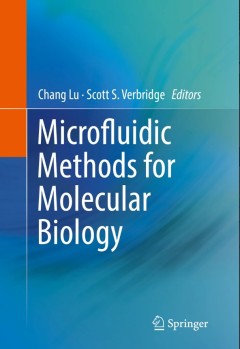
Microfluidic Methods for Molecular Biology
This book covers the state-of-the-art research on molecular biology assays and molecular techniques enabled or enhanced by microfluidic platforms. Topics covered include microfluidic methods for cellular separations and single cell studies, droplet-based approaches to study protein expression and forensics, and microfluidic in situ hybridization for RNA analysis. Key molecular biology studies u…
- Edition
- 1
- ISBN/ISSN
- 978-3-319-30017-7
- Collation
- XII, 376
- Series Title
- -
- Call Number
- -
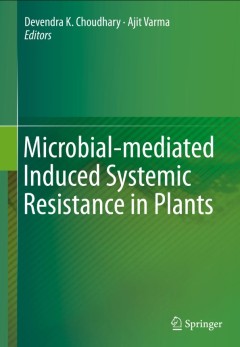
Microbial-mediated Induced Systemic Resistance in Plants
With a focus on food safety, this book highlights the importance of microbes in sustainable agriculture. Plants, sessile organisms that are considered as primary producers in the ecosystem and communicate with above- and below-ground communities that consist of microbes, insects, and other vertebrate and invertebrate animals, are subjected to various kinds of stress. Broadly speaking, these can…
- Edition
- 1
- ISBN/ISSN
- 978-981-10-0387-5
- Collation
- X, 226
- Series Title
- -
- Call Number
- -
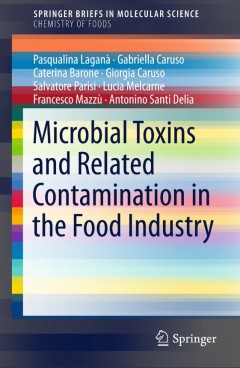
Microbial Toxins and Related Contamination in the Food Industry
This Brief concerns the chemical risk in food products from the viewpoint of microbiology. The “Hazard Analysis and Critical Control Point” (HACCP) approach, which is applied for this purpose, is dedicated to the study and the analysis of all possible dangers by food consumptions and the related countermeasures with the aim of protecting the health of consumers. This difficult objective is …
- Edition
- -
- ISBN/ISSN
- 978-3-319-20558-8
- Collation
- VI, 101
- Series Title
- SpringerBriefs in Molecular Science
- Call Number
- -
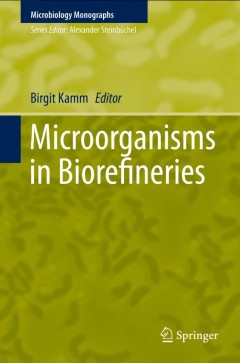
Microorganisms in Biorefineries
The book describes how plant biomass can be used as renewable feedstock for producing and further processing various products. Particular attention is given to microbial processes both for the digestion of biomass and the synthesis of platform chemicals, biofuels and secondary products. Topics covered include: new metabolic pathways of microbes living on green plants and in silage; using ligno…
- Edition
- 1
- ISBN/ISSN
- 978-3-662-45208-0
- Collation
- X, 369
- Series Title
- Microbiology Monographs
- Call Number
- -

Microscale Technologies for Cell Engineering
This book offers readers cutting-edge research at the interface of polymer science and engineering, biomedical engineering, materials science, and biology. State-of-the-art developments in microscale technologies for cell engineering applications are covered, including technologies relevant to both pluripotent and adult stem cells, the immune system, and somatic cells of the animal and human or…
- Edition
- 1
- ISBN/ISSN
- 978-3-319-20725-4
- Collation
- VIII, 330
- Series Title
- -
- Call Number
- -

The Root Canal Biofilm
This book presents the current state of research on the basic scientific aspects of root canal biofilm biology within a clinically applicable context. Root canal biofilms are complex polymicrobial structures adhering to the root canal surface that are formed by microorganisms invading the pulpal space of teeth, and are associated with persistent root canal infections. Concerted efforts to study…
- Edition
- -
- ISBN/ISSN
- 978-3-662-47415-0
- Collation
- -
- Series Title
- -
- Call Number
- -

Microbial Endocrinology: Interkingdom Signaling in Infectious Disease and Health
Prof. Mark Lyte, Ph.D., M.S., MT(ASCP) is a Professor in the Department of Veterinary Microbiology and Preventive Medicine, College of Veterinary Medicine, Iowa State University. Prof. Lyte conducted experiments in 1991 that subsequently led him shortly thereafter to propose and found the field of microbial endocrinology. In addition to having served on scientific review panels for the National…
- Edition
- 1
- ISBN/ISSN
- 978-3-319-20214-3
- Collation
- XIII, 374
- Series Title
- Advances in Experimental Medicine and Biology
- Call Number
- -

The Role of Microenvironment in the Control of Tumor Angiogenesis
This work describes the importance of tumor microenvironment in favouring tumor progression and angiogenesis. Under physiological conditions, angiogenesis is dependent on the balance of positive and negative angiogenic modulators within the vascular microenvironment and requires the functional activities of a number of molecules, including angiogenic factors, extracellular matrix proteins, a…
- Edition
- -
- ISBN/ISSN
- 978-3-319-27820-9
- Collation
- -
- Series Title
- -
- Call Number
- -
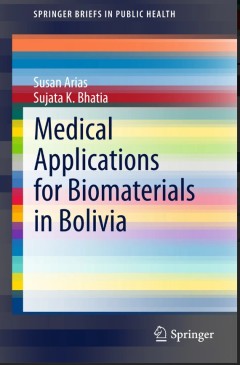
Medical Applications for Biomaterials in Bolivia
This book investigates the potential medical benefits natural biomaterials can offer in developing countries by analyzing the case of Bolivia. The book explores the medical and health related applications of Bolivian commodities: quinoa, barley, sugarcane, corn, sorghum and sunflower seeds. This book helps readers better understand some of the key health concerns facing countries like Bolivia a…
- Edition
- 1
- ISBN/ISSN
- 978-3-319-16774-9
- Collation
- X, 62
- Series Title
- SpringerBriefs in Public Health
- Call Number
- -

MicroRNAs and Other Non-Coding RNAs in Inflammation
The book serves as a comprehensive resource for scientists and clinicians studying the role of non-coding RNAs in inflammation (viral infections, wound inflammation), human inflammatory diseases (i.e. rheumatoid arthritis, Crohn’s disease, diabetes) and innate immunity. It provides a universal reference work comprising both basic and specialized information. Given that ncRNAs represent new th…
- Edition
- 1
- ISBN/ISSN
- 978-3-319-13688-2
- Collation
- X, 237
- Series Title
- Progress in Inflammation Research
- Call Number
- -
 Computer Science, Information & General Works
Computer Science, Information & General Works  Philosophy & Psychology
Philosophy & Psychology  Religion
Religion  Social Sciences
Social Sciences  Language
Language  Pure Science
Pure Science  Applied Sciences
Applied Sciences  Art & Recreation
Art & Recreation  Literature
Literature  History & Geography
History & Geography